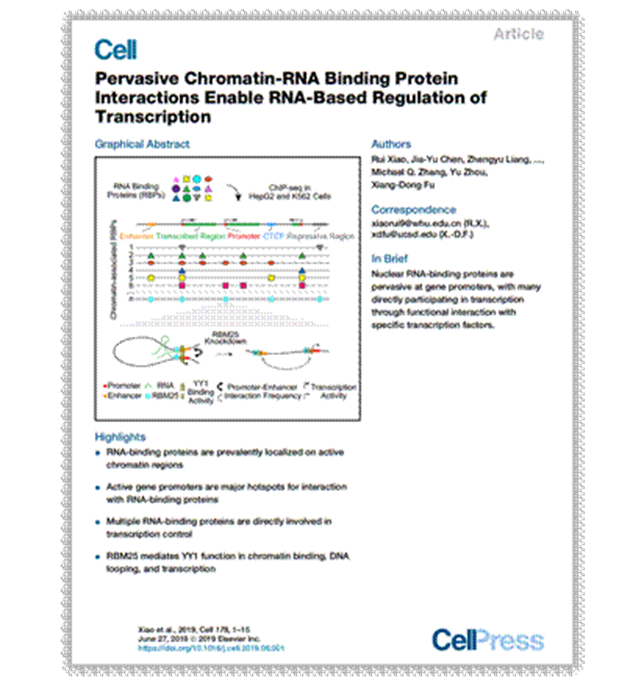On June 27th, Cell published an article online, reporting the latest research findings by researcher Xiao Rui in WHU and Prof. Fu Xiangdong’s team in UCSD. Xiao is a researcher at Medical Research Institute and Frontier Science Center for Immunology and Metabolism, Wuhan University. The co-corresponding author Prof. Fu and his research team are from the University of California, San Diego (UCSD).
The article is entitled Pervasive Chromatin-RNA Binding Protein Interactions Enable RNA-based Regulation of Transcription and Xiao is the co-first author and corresponding author.

RNA binding proteins play an important regulatory role during the metabolism of RNA, such as splicing processing, modification, transport, cell localization, stability, translation and degradation and so on after the transcription, but its regulatory function and mechanism at the transcriptional level have not been systematically studied. With the large-scale ChIP-seq (Chromatin Immunoprecipitation Sequencing) technology, the interaction between 63 RNA binding proteins with cell nucleus localization and chromatin was detected. Xiao and his co-workers happened to discover that about 60% of RNA binding proteins interact extensively with chromatin and this was especially prominent in gene promoter and enhancer regions
More intriguingly, although only a small proportion of RNA binding proteins in human genome (<5%) was detected in the research, a specific binding of RNA binding proteins was found to exist in 40% of the active chromatin region and 70% of the active promoter region. This indicates that RNA binding proteins can function extensively at chromatin level. Later on, a strong transcriptional regulation in some RNA binding proteins was testified by GRO-seq (Global Nuclear Run-On sequencing) experiments.
The research also focuses on the molecular mechanism of RNA binding protein RBM25 that can regulate chromatin structure and transcriptional activation inhibition through regulating the binding of transcription factor YY1 to chromatin, thus fully demonstrating the functional regulation of specific RNA binding protein mediated transcription factor YY1. This discovery proposed a new concept of RNA binding proteins as transcription factors or cofactors to regulate transcription and opened a new field of research on the function of RNA binding proteins.

Xiao Rui is a returning talent introduced by Medical Research Institute in 2017. He got his bachelor degree and doctoral degree in the school of life sciences, Wuhan University and was under the instruction of Prof. Fu Xiangdong, an expert in RNA research, in UCSD during doctoral and post-doctoral period. Xiao has been devoted to research in his beloved RNA biology and functional genomics and obtained a series of significant achievements. In recent years, as the co-first author and corresponding author, he has published a number of high-level research papers in top journals, including Cell (1article), Nature (2 articles) and Molecular Cell (2 articles).Dr. Chen Yujia and Dr. Liang Zhengyu in UCSD are co-first authors. Prof. Fu Xiangdong is co-correspondent. Other co-authors include Prof. Zhou Yu and Associate Prof. Luo Daji in WHU, Prof. Lu Zhi, Zhang Qiwei and assistant researcher Chen Yang in THU, Prof. Liu Wen in XMU, Prof. Christopher Berge in MIT, Prof. Gene Yeo in UCSD, Prof Breton Graveley in UConn and Prof. Eric Lecuyer in UdeM. The research is sponsored by National Natural Science Foundation of China and initial funding for talents and research on “Double First-Class” of Wuhan University.
Picture: Medical Research Institute
Correspondent: Ye Wen
Rewritten by Cao Siyi
Edited by Shen Yuxi and Hu Sijia